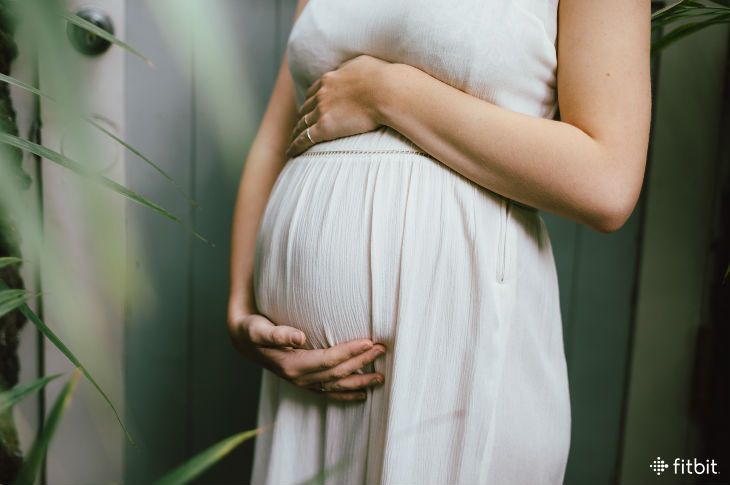
Pregnancy is all about change, and when it comes to your body, those changes can be major. But besides the obvious external changes (hello, maternity pants!), there’s a whole lot that happens inside your body once you become pregnant. “The best part of being pregnant may be not having to worry about your period for nine months!” says Kate White, MD, MPH, assistant professor of obstetrics and gynecology at Boston University.
You’re probably already anticipating the baby bump, stretchy pants, and possible ice cream cravings, but what can you expect to happen to your period when you’re expecting?
What Happens to Your Period When You’re Pregnant
When you become pregnant, you stop getting your period for the duration of your pregnancy. Here’s why:
In the first half of your cycle (the follicular phase), the lining of your uterus thickens and increasing levels of follicle stimulating hormone (FSH) help a number of follicles on your ovaries to grow. One of these follicles grows faster and stronger than the others and starts to produce estrogen, causing the other follicles to break down. Luteinizing hormone (LH) begins to surge, causing the dominant follicle to release an egg; this is ovulation.
In the second half of your cycle (the luteal phase), the ruptured follicle closes and forms a structure called the corpus luteum that produces progesterone. If the egg that was released during ovulation isn’t fertilized, the corpus luteum degenerates, and estrogen and progesterone levels drop, triggering you to shed your built-up uterine lining; this is your period.
If, however, the egg is fertilized, the resulting embryo implants in the uterus and starts to produce a hormone called human chorionic gonadotropin (HCG), which keeps the corpus luteum from breaking down. The corpus luteum then continues to produce progesterone, which keeps the uterine lining and cervical mucus thick to nourish the developing fetus and keep sperm and bacteria out of the uterus. Because the corpus luteum remains intact and estrogen and progesterone stay elevated, the uterine lining isn’t shed and your periods stop.
Reasons for Bleeding in Early Pregnancy
Even though your period stops, there are other reasons you may experience vaginal bleeding while pregnant.
First, it’s important to understand that some “spotting” (a few occasional drops of blood on your underwear, but not enough to cover a pantyliner) can be normal during very early pregnancy. “Bleeding” is defined by a heavier flow that requires a liner or pad to prevent blood from staining your clothes. Bleeding in early pregnancy isn’t always a sign of something serious. Sometimes when the fertilized egg implants in the uterus, it can cause bleeding, as can sex, hormonal changes, and other factors that don’t signify trouble.
But bleeding during pregnancy can also be a sign of something serious, like an ectopic pregnancy (when the fertilized egg implants and develops outside the uterus). If an ectopic pregnancy isn’t treated, it can be life-threatening for a woman, so it’s important to report any spotting to your doctor right away so that the appropriate tests can be ordered as soon as possible.
“Bleeding in early pregnancy may also be the first sign of a miscarriage,” says White. “If you have bleeding that is as heavy as a period, let your doctor or midwife know.”
Your First Period After Pregnancy
The first six weeks after the baby is born is the postpartum period (sometimes called “puerperium”). It refers to about how long it may take for your body to go back to its nonpregnant state. Every woman is different, so the duration of your puerperium may be longer or shorter.
During the postpartum period, your periods may return back to your previous nonpregnant pattern, or they may change. Menstrual cycles generally won’t resume while a woman is breastfeeding, so if you’re nursing, you may not get a period for a few months. That’s because in order to produce breast milk, your brain has to produce higher levels of a hormone called prolactin, which suppresses ovulation. And if you don’t ovulate, you can’t have a period (although you may experience non-menstrual vaginal bleeding for a variety of other reasons).
If you’re breastfeeding, the timing of your first postpartum period will depend on a lot of factors—like how much and how often you’re feeding the baby and whether you’re supplementing with formula. Many women who breastfeed start having regular periods within 36 weeks (nine months) of delivery.
“Word to the wise: Your first period after a baby may be a doozy,” says White. “I found this out the hard way when a nurse pulled me aside at work to gently let me know that I had bled through my scrub pants. Thank goodness I could easily swap them for another set. But I couldn’t believe how heavy those first two days were.”
Most women who don’t breastfeed will resume having periods around eight weeks after delivery, although it’s possible to have the first as early as 40 days postpartum.
Postpartum Fertility
It’s important to remember that you can still become pregnant again soon after delivery even if your periods haven’t returned yet. That’s because ovulation happens about 14 days before menstruation, so it’s possible for your ovary to release an egg before you realize your cycles have resumed. If you don’t want to become pregnant soon after delivery, talk to your doctor about birth control options.
“The best time to have this conversation is while you’re still pregnant,” says White. “In the third trimester, when the idea of delivery is starting to become real, mention to your doctor that you want to talk about birth control. You may be able to start your method in the hospital before you are discharged. Having a baby is wonderful, but many women don’t want to repeat the experience nine months later.”
Period Changes After Pregnancy
For some women, menstrual cycles go back to their typical pattern post pregnancy, and for other women, period changes can occur. Some women have heavier, longer, or more painful periods after they have a baby, while others have lighter, shorter periods with less pain postpartum. In some cases, major changes to menstrual cycles can indicate a serious problem or complication, but in other cases, these changes are nothing to worry about. If you’re concerned about any changes to your period after pregnancy, make an appointment with your doctor.
This information is for educational purposes only and is not intended as a substitute for medical diagnosis or treatment. You should not use this information to diagnose or treat a health problem or condition. Always check with your doctor before changing your diet, altering your sleep habits, taking supplements, or starting a new fitness routine.

Great to see this added feature, but you’ve skipped a huge part of female health! PREGNANCY – great to see your fertile days and predicted period dates but if your a user that is pregnant, why is there no way to simply record this?
I was wondering the same thing?